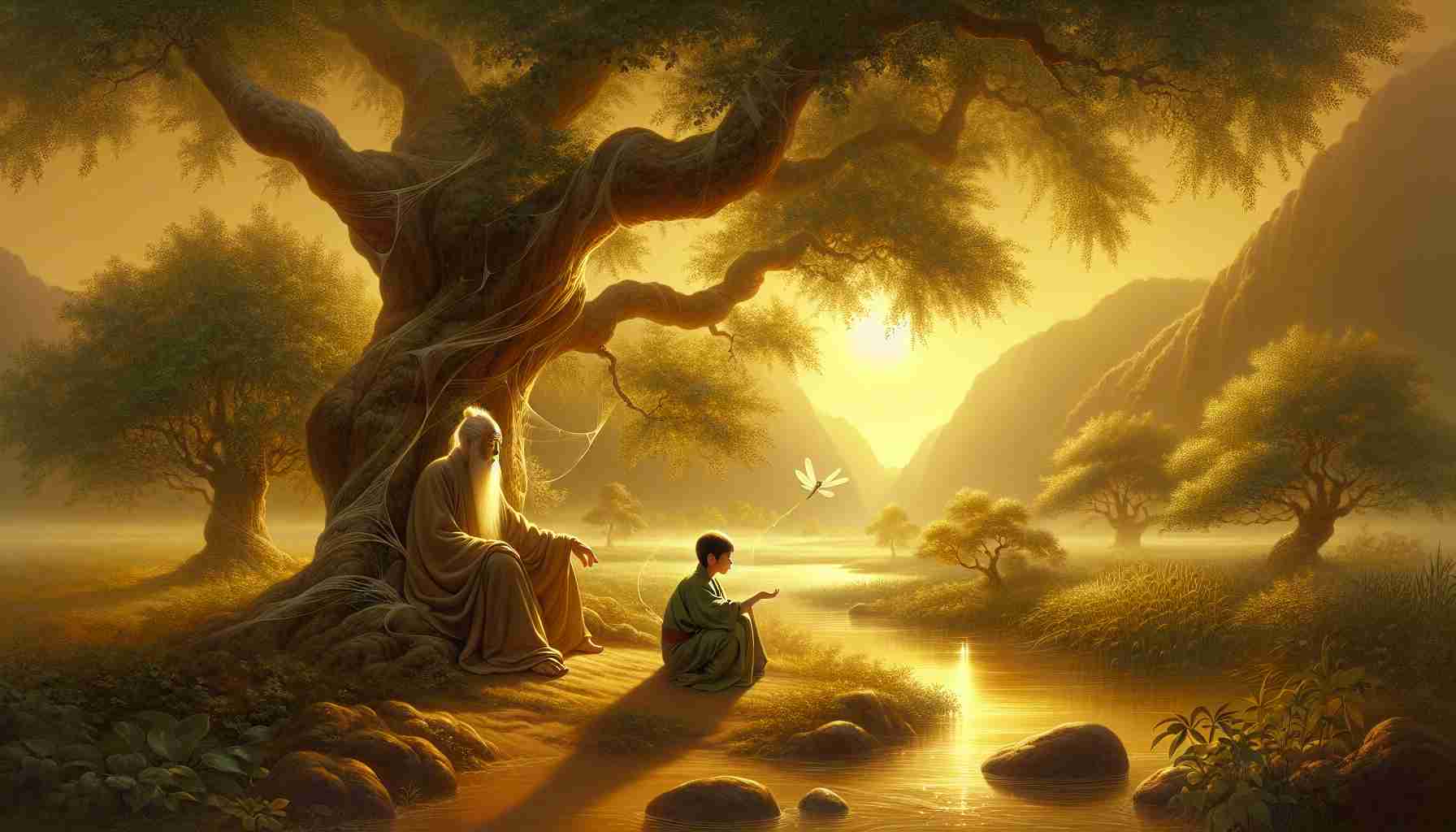

I had always thought the more I planned, the better life would be. Schedules, goals, and achievements—they gave me a sense of control. But one hot summer day changed all of that.
I was a young student, traveling through the valleys of ancient Chen State to meet a man named Sima Hua. People spoke about him in whispers, calling him “The Man Who Forgot His Self.” Strange, I thought. How could someone forget who they were?
I found Sima Hua sitting under a tall plum tree, peaceful and still, as if he were part of nature itself. He wore a plain robe and looked no different from a farmer or a beggar. I bowed and said, “Honored one, I wish to understand the Tao. Will you teach me?”
He smiled, but said nothing. Instead, he pointed to the river that ran nearby. I looked, confused.
“The river flows, but it does not try,” he said after a long pause. “It moves around rocks, over soil, through towns. It never forces its way. It simply is.”
I nodded, still unsure.
I spent several days with Sima Hua. He never lectured. He didn’t offer scrolls full of wisdom. Instead, he worked in the garden, brewed tea, sat with the wind. I tried to ask questions, but he always answered them with another question or a simple story.
One morning, I found a dragonfly caught in a spider’s web. I reached to pull it out, but my movements shook the web and harmed the dragonfly further.
Sima Hua stood behind me. “Sometimes,” he said gently, “our wish to help can cause more harm when we act too quickly.”
I stepped back and watched quietly. The dragonfly wiggled, paused… and then freed itself without my help.
That night, I sat beside the plum tree, thinking. All this time, I had tried to plan my life like a builder stacking stones. But the Tao wasn’t something to build. It was something to follow, like a path already made.
I turned to Sima Hua. “How did you forget yourself?” I asked.
He looked at the stars, then answered, “I didn’t forget like losing an object. I let go. I let go of trying to be someone special. I let go of needing to shape the world. And in return, I found peace.”
A breeze passed between us, gentle and cool.
I stayed a few more days. Then I left without saying goodbye. Not because I was rude—but because I understood.
The Tao doesn’t need ceremonies. It just flows.
As I walked back through the valley, I stopped planning what to do next. Instead, I saw the flowers blooming, heard the crickets chirping, and felt the earth beneath my feet.
I hadn’t changed overnight. But now, whenever I feel the urge to control everything, I remember the river. And like Sima Hua, I work each day to let go—just a little more—and flow with the Way.
I had always thought the more I planned, the better life would be. Schedules, goals, and achievements—they gave me a sense of control. But one hot summer day changed all of that.
I was a young student, traveling through the valleys of ancient Chen State to meet a man named Sima Hua. People spoke about him in whispers, calling him “The Man Who Forgot His Self.” Strange, I thought. How could someone forget who they were?
I found Sima Hua sitting under a tall plum tree, peaceful and still, as if he were part of nature itself. He wore a plain robe and looked no different from a farmer or a beggar. I bowed and said, “Honored one, I wish to understand the Tao. Will you teach me?”
He smiled, but said nothing. Instead, he pointed to the river that ran nearby. I looked, confused.
“The river flows, but it does not try,” he said after a long pause. “It moves around rocks, over soil, through towns. It never forces its way. It simply is.”
I nodded, still unsure.
I spent several days with Sima Hua. He never lectured. He didn’t offer scrolls full of wisdom. Instead, he worked in the garden, brewed tea, sat with the wind. I tried to ask questions, but he always answered them with another question or a simple story.
One morning, I found a dragonfly caught in a spider’s web. I reached to pull it out, but my movements shook the web and harmed the dragonfly further.
Sima Hua stood behind me. “Sometimes,” he said gently, “our wish to help can cause more harm when we act too quickly.”
I stepped back and watched quietly. The dragonfly wiggled, paused… and then freed itself without my help.
That night, I sat beside the plum tree, thinking. All this time, I had tried to plan my life like a builder stacking stones. But the Tao wasn’t something to build. It was something to follow, like a path already made.
I turned to Sima Hua. “How did you forget yourself?” I asked.
He looked at the stars, then answered, “I didn’t forget like losing an object. I let go. I let go of trying to be someone special. I let go of needing to shape the world. And in return, I found peace.”
A breeze passed between us, gentle and cool.
I stayed a few more days. Then I left without saying goodbye. Not because I was rude—but because I understood.
The Tao doesn’t need ceremonies. It just flows.
As I walked back through the valley, I stopped planning what to do next. Instead, I saw the flowers blooming, heard the crickets chirping, and felt the earth beneath my feet.
I hadn’t changed overnight. But now, whenever I feel the urge to control everything, I remember the river. And like Sima Hua, I work each day to let go—just a little more—and flow with the Way.